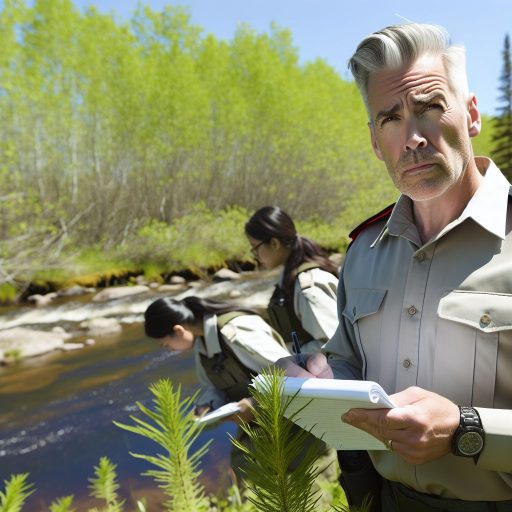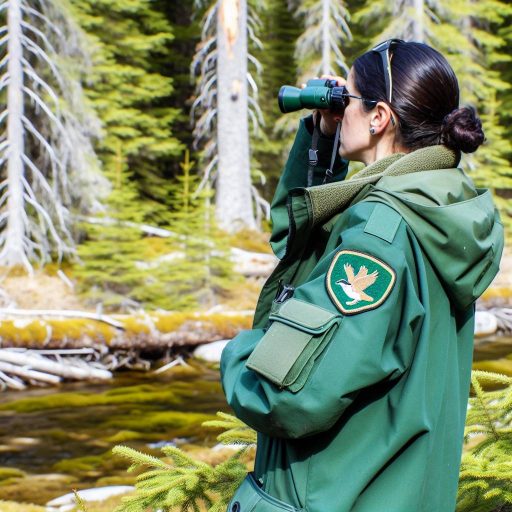Overview of the Role of Environmental Officers in Canada
Environmental officers play a crucial role in Canada’s stewardship of natural resources.
They enforce environmental laws and regulations to protect ecosystems.
Moreover, they assess environmental impacts of projects and activities.
Key Responsibilities
Environmental officers monitor compliance with environmental regulations.
They conduct inspections and investigate complaints related to pollution.
Additionally, they collect samples for analysis to gauge environmental health.
This ensures that businesses and organizations adhere to environmental standards.
Collaboration with Stakeholders
Environmental officers work closely with various stakeholders.
They collaborate with government agencies, NGOs, and the public.
Furthermore, they engage with Indigenous communities to respect land rights.
These collaborations enhance environmental decision-making processes.
Policy Development and Education
In addition to enforcement, environmental officers help develop policies.
They provide expert advice to policymakers based on scientific data.
Education is also a key component of their role.
They organize workshops and information sessions to raise awareness.
Career Opportunities
The demand for environmental officers continues to grow across Canada.
They can work in various sectors, including government and private industry.
Additionally, roles exist in non-profit organizations and consulting firms.
Continual education and training are essential for career advancement.
Types of Work Environments for Environmental Officers
Field-Based Work
The field is a primary work environment for many environmental officers.
These officers often conduct onsite assessments and inspections.
They monitor environmental conditions and collect samples for analysis.
Fieldwork requires travel to various locations and ecosystems.
This role allows officers to engage directly with nature and communities.
Office-Based Work
Many environmental officers work in office settings.
Unlock Your Career Potential
Visualize a clear path to success with our tailored Career Consulting service. Personalized insights in just 1-3 days.
Get StartedIn offices, they analyze data and prepare reports.
They collaborate with other professionals on environmental initiatives.
Office work often involves project management and strategic planning.
This environment allows for in-depth analysis and administrative tasks.
Laboratory Work
Laboratories provide another crucial work environment for environmental officers.
Officers analyze samples collected from fieldwork in these settings.
They utilize advanced technology for accurate testing and data collection.
This work supports scientific research and environmental policy development.
Officers in labs contribute significantly to understanding environmental issues.
Community Engagement
Community engagement is vital for environmental officers.
They often participate in public awareness and education programs.
This role fosters collaboration between the government and the community.
Officers gather feedback and address concerns from local populations.
Such interactions enhance transparency and community support for initiatives.
Remote and Hybrid Work
Increasingly, environmental officers have remote and hybrid work options.
This setup allows greater flexibility and work-life balance.
Technological tools enable effective communication and project management.
Officers can collaborate with teams while working from home.
This shift has broadened opportunities for many professionals in the field.
Fieldwork vs. Office Work: A Comparative Analysis
Overview of the Work Environments
Environmental officers in Canada experience diverse work environments.
These environments generally fall into two categories: fieldwork and office work.
Each type of work offers unique challenges and benefits.
Understanding Fieldwork
Fieldwork involves outdoor activities that require direct interaction with the environment.
Officers conduct inspections and collect data in various ecosystems.
This hands-on approach fosters a deep connection with nature.
Fieldwork often takes place in remote areas, making mobility essential.
Workers frequently face unpredictable weather conditions.
Advantages of Fieldwork
Fieldwork enhances practical skills and knowledge of local ecosystems.
Additionally, it allows for real-time data collection and analysis.
Moreover, officers can identify and address environmental issues promptly.
Challenges of Fieldwork
Fieldwork can be physically demanding and requires resilience.
Officers may work irregular hours, including evenings and weekends.
Furthermore, fieldwork often necessitates extensive travel, incurring costs.
Exploring Office Work
Office work revolves around administrative tasks and research activities.
Environmental officers analyze data, prepare reports, and develop policies.
This work fosters collaboration among various stakeholders.
Additionally, office work allows for a structured schedule and environment.
Advantages of Office Work
Office work provides a stable environment with fewer physical demands.
It enables officers to focus on analysis and strategic planning.
Additionally, collaboration with experts can enhance program effectiveness.
Challenges of Office Work
The office environment can sometimes feel isolating and less fulfilling.
Officers may miss the direct impact of their efforts on the environment.
Moreover, prolonged screen time can lead to fatigue and health issues.
Finding a Balance
Effective environmental management combines fieldwork and office work.
Many professionals alternate between both roles to use their skills fully.
This combination addresses the diverse challenges in environmental protection.
By balancing these environments, officers can ensure a comprehensive approach.
You Might Also Like: Career Opportunities for Veterans Affairs Officers
Key Skills Required for Different Work Environments
Fieldwork Environments
Environmental officers often work in various field settings.
Strong observational skills help officers assess environmental conditions.
Additionally, they must analyze data on-site.
Another crucial skill involves physical stamina for outdoor activities.
Communication skills are essential for collaborating with local communities.
Flexibility allows officers to adapt to changing weather conditions.
Office Environments
In office settings, environmental officers focus on policy work.
Strong analytical skills support effective research and data management.
Writing skills enhance their ability to create reports and proposals.
Project management skills are vital for overseeing various initiatives.
Teamwork fosters collaboration with colleagues and stakeholders.
Additionally, proficiency in software tools streamlines workflow and analysis.
Laboratory Environments
Laboratory settings require specialized technical skills.
Attention to detail ensures accurate testing and experimentation.
Knowledge of safety protocols maintains a safe working environment.
Experimental design skills facilitate effective research methodologies.
Moreover, critical thinking aids in interpreting complex data.
Collaborative skills are important when working with scientists and researchers.
Regulatory Environments
Working with governmental policies demands strong negotiation skills.
In-depth knowledge of environmental laws is critical for compliance.
Effective networking helps build relationships with various stakeholders.
Research skills ensure officers stay current with regulations and trends.
Problem-solving abilities are essential for addressing compliance issues.
Additionally, public speaking skills enhance presentations to policymakers.
Discover More: Environmental Officer Career Opportunities in Canada
Impact of Work Environment on Job Performance and Satisfaction
Role of Physical Environment
The physical work environment significantly affects job performance.
Employees thrive in well-lit, spacious areas.
Moreover, clean and organized spaces boost mood and efficiency.
On the contrary, cluttered environments can cause distractions.
Additionally, ergonomic furniture plays a crucial role in comfort.
Psychological Factors at Work
The psychological aspect of work environments is equally important.
A positive atmosphere fosters collaboration and innovation.
Supportive colleagues enhance job satisfaction and morale.
Conversely, toxic workplaces lead to stress and burnout.
Employers should cultivate a culture of respect and openness.
Impact of Remote Work
Remote work presents unique challenges and opportunities.
Flexibility often leads to increased job satisfaction.
Employees appreciate the elimination of commute times.
However, isolation can affect mental health adversely.
Regular virtual check-ins maintain connection among team members.
Importance of Employer Support
Employer support is vital for employee satisfaction.
Resources for mental health and professional growth are essential.
Workshops and training programs enhance skills and confidence.
Furthermore, recognition of achievements boosts morale significantly.
Establishing open communication channels fosters trust.
Factors Impacting Workplace Satisfaction
Several factors impact job performance and satisfaction.
Employers must prioritize creating a conducive work environment.
Active engagement with employees will yield positive results.
Ultimately, a supportive workplace breeds success and fulfillment.
See Related Content: Environmental Laws Every Canadian Officer Should Know

Typical Work Settings
Government Agencies
Canadian environmental officers often work in government agencies.
These agencies include Environment and Climate Change Canada.
They implement and enforce environmental regulations.
Environmental assessments form a major part of their responsibilities.
Officers also work on policy development to protect ecosystems.
Collaboration with other governmental departments is common.
This teamwork strengthens Canada’s overall environmental efforts.
NGOs
Non-governmental organizations play a crucial role in environmental work.
Many environmental officers find employment with NGOs.
These organizations often focus on conservation and outreach programs.
They conduct field research and community education initiatives.
Officers may also work on advocacy for sustainable practices.
NGOs partner with local communities to address environmental concerns.
This collaboration enhances the effectiveness of their projects.
Private Sector
The private sector increasingly hires environmental officers.
Companies seek to comply with environmental regulations.
These officers conduct audits to ensure regulatory compliance.
They develop strategies for reducing environmental impacts.
Many work in industries like forestry, mining, and agriculture.
Environmental officers assist in corporate social responsibility initiatives.
They help companies adopt sustainable business practices.
By doing so, they contribute to a healthier planet.
See Related Content: Qualifications Needed for Veterans Affairs Officer Jobs
Challenges Faced by Environmental Officers in Various Environments
Field-Based Challenges
Environmental officers often work in remote, rugged terrains.
These locations pose risks such as extreme weather conditions.
Additionally, accessibility is often limited, complicating their duties.
Wildlife encounters can also present significant safety concerns.
Officers must navigate these challenges while collecting necessary data.
Regulatory and Compliance Issues
Understanding local and federal regulations is crucial.
Environmental officers must stay updated on changing policies.
They often deal with non-compliance issues from various industries.
This creates pressure to enforce regulations effectively and fairly.
Moreover, managing relationships with stakeholders adds complexity.
Interdepartmental Coordination
Environmental officers regularly collaborate with multiple departments.
Coordination between agencies can lead to misunderstandings.
Clear communication is essential for effective teamwork.
Conflicting priorities among different departments often arise.
This ambiguity can hinder the timely execution of environmental projects.
Public Engagement and Education
Officers frequently engage with the public about environmental issues.
Educating communities creates an informed citizenry.
However, public resistance to change can be challenging.
Officers must use effective communication strategies to engage diverse groups.
Securing community support is vital for successful initiatives.
Data Collection and Analysis
Data collection in the field can be both challenging and time-consuming.
Officers often face technological limitations in remote areas.
Analyzing data requires specialized skills and training.
Environmental officers must maintain accurate records for compliance.
This ensures effective decision-making based on the data gathered.
Future Trends in Work Environments for Environmental Officers in Canada
Emphasis on Remote Work
Remote work becomes increasingly important for environmental officers.
This trend allows flexibility in work hours and locations.
Environmental officers can spend more time in the field, enhancing data collection.
Companies adopt innovative technologies to facilitate remote collaboration.
Virtual meetings reduce travel needs, saving time and resources.
Integration of Technology
Technological advancements significantly impact work environments.
Environmental officers utilize data analytics for informed decision-making.
Geographic Information Systems (GIS) improve project planning efficiency.
Drones offer new perspectives for environmental monitoring and assessments.
Artificial intelligence enhances predictive modeling for environmental changes.
Collaborative Workspaces
Companies increasingly design collaborative workspaces to foster teamwork.
Open office designs promote communication among environmental officers.
Shared spaces encourage brainstorming and innovative solutions.
These environments help address complex environmental challenges collectively.
Focus on Mental Health and Wellbeing
Organizations prioritize mental health in workplace design and policies.
Flexible schedules support work-life balance, reducing stress levels.
Green spaces within or near office locations enhance employee wellbeing.
Mindfulness programs contribute to a healthier work environment.
Commitment to Sustainability
Environmental officers increasingly engage in sustainable practices at work.
Organizations adopt green building certifications for their facilities.
Using renewable energy sources minimizes ecological footprints.
Waste reduction initiatives ensure responsible resource management.
Employees actively participate in sustainability audits and improvements.




